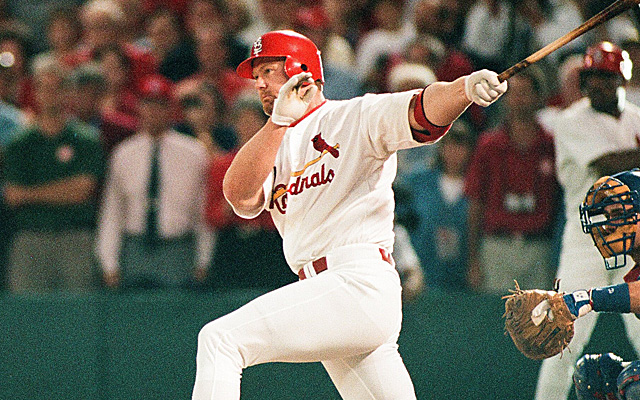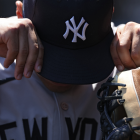More HOF: One-and-dones | Kendall | Griffey | Hoffman | Edmonds | Wagner | Trammell | Smith | Garciaparra
With the BBWAA Hall of Fame vote announcement mere weeks away, we’re in the midst of running down each candidate on the ballot for 2016 and examining his case for Cooperstown. Up this time around is Mark McGwire.
The case for McGwire is simple: He was one of the greatest home run hitters in the history of the game. Across parts of 16 big-league seasons, McGwire tallied 583 home runs (10th on the all-time list); 1,414 RBI (41st all-time); and 841 extra-base hits (95th all-time). As well, McGwire’s career slugging percentage of .588 is seventh all-time, and he owns the lowest at-bats per home run mark (10.61) in major-league history (just ahead of Babe Ruth).
McGwire also led the majors in homers five times, he topped hit 50 or more in a season on four occasions (and hit 49 in his rookie season). Additionally, he’s the only hitter ever to hit 65 or more homers in two different seasons. His 70 homers in 1998 was the all-time single-season record until Barry Bonds broke McGwire’s mark in 2001.
While McGwire is sometimes derided as a one-dimensional hitter, there was another element of his value at the plate -- the ability to get on base. On that point, McGwire’s career on-base percentage of .394 ranks 80th all-time, and he’s 41st all-time in walks. Yes, McGwire played in a hitter’s era, but his context- and park-adjusted OPS+ of 163 ranks 12th all-time. McGwire was as well a 12-time All-Star, and five times he finished in the top 10 in the MVP balloting. He won three Silver Sluggers and a Gold Glove in 1990.
While those who impugn McGwire as a one-dimensional candidate are being overly reductive in their estimations of him, they do have a point on a broader level. McGwire, for the balance of his career, provided negative value on the bases and in the field. As well, he was often injured, particularly during the latter two-thirds of his career. And while a simple hits total doesn’t begin to tell the story of McGwire as a producer, his career tally of 1,626 hits is plainly low by Hall of Fame standards. There are also his high strikeout totals and occasionally high GIDP totals.
McGwire was adept at the two most important things a hitter can do -- hitting for power and getting on base. But there are holes in his game when you consider the full spectrum of value. That’s probably why Jay Jaffe’s JAWS system pegs McGwire as being just a bit shy of the established Cooperstown standards for first basemen.
That said, McGwire’s JAWS score doesn’t explain how his BBWAA ballot percentages have tracked in his nine years of eligibility ...

As you can see, McGwire has never come close to the 75 percent mark needed for election, and he's also very much trending in the wrong direction.
You're no doubt aware that there's more to McGwire's story than just the numbers. McGwire was long suspected of having used performance-enhancing drugs during his playing days. Then, in January of 2010, he admitted as much:
Steroids weren't formally banned by MLB until 2002, and McGwire's use of them predates that policy. That said, that admission of using an illegal and later banned substance known to enhance strength and, by extension, some aspects of athletic performance, is enough to disqualify an already borderline candidate in the eyes of many. For evidence of that claim, just take a look at that balloting trendline above once more.
McGwire's somewhat lacking JAWS score notwithstanding, would a candidate with 583 homers and a legendary peak be frozen out of Cooperstown absent the steroids factor? That seems highly unlikely. In any event, McGwire has no shot at at induction via the BBWAA route. That's especially the case given that it's his final year on the ballot. Maybe, many years from now, some veterans' committee will see things differently.

![[object Object] Logo](https://sportshub.cbsistatic.com/i/2020/04/22/e9ceb731-8b3f-4c60-98fe-090ab66a2997/screen-shot-2020-04-22-at-11-04-56-am.png)

















